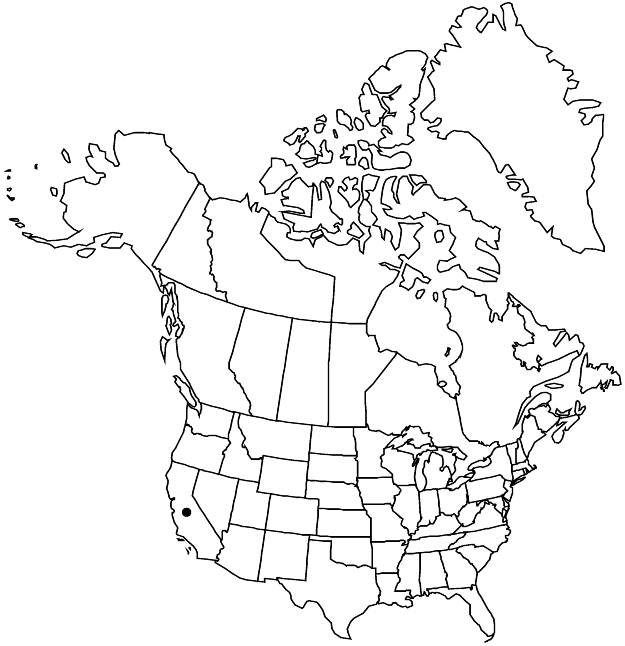Difference between revisions of "Eriogonum gilmanii"
Leafl. W. Bot. 3: 16. 1941.
FNA>Volume Importer |
imported>Volume Importer |
||
| (5 intermediate revisions by one other user not shown) | |||
| Line 8: | Line 8: | ||
}} | }} | ||
|common_names=Gilman’s wild buckwheat | |common_names=Gilman’s wild buckwheat | ||
| + | |special_status={{Treatment/ID/Special_status | ||
| + | |code=E | ||
| + | |label=Endemic | ||
| + | }} | ||
|basionyms= | |basionyms= | ||
|synonyms= | |synonyms= | ||
| Line 24: | Line 28: | ||
|elevation=1500-2000 m | |elevation=1500-2000 m | ||
|distribution=Calif. | |distribution=Calif. | ||
| − | |discussion=<p>Eriogonum gilmanii is a rare, localized species. It is known from the Cottonwood, Last Chance, and Panamint mountains of Inyo County.</p> | + | |discussion=<p><i>Eriogonum gilmanii</i> is a rare, localized species. It is known from the Cottonwood, Last Chance, and Panamint mountains of Inyo County.</p> |
|tables= | |tables= | ||
|references= | |references= | ||
| Line 33: | Line 37: | ||
-->{{#Taxon: | -->{{#Taxon: | ||
name=Eriogonum gilmanii | name=Eriogonum gilmanii | ||
| − | |||
|authority=S. Stokes | |authority=S. Stokes | ||
|rank=species | |rank=species | ||
| Line 47: | Line 50: | ||
|publication title=Leafl. W. Bot. | |publication title=Leafl. W. Bot. | ||
|publication year=1941 | |publication year=1941 | ||
| − | |special status= | + | |special status=Endemic |
| − | |source xml=https:// | + | |source xml=https://bitbucket.org/aafc-mbb/fna-data-curation/src/2e0870ddd59836b60bcf96646a41e87ea5a5943a/coarse_grained_fna_xml/V5/V5_656.xml |
|subfamily=Polygonaceae subfam. Eriogonoideae | |subfamily=Polygonaceae subfam. Eriogonoideae | ||
|genus=Eriogonum | |genus=Eriogonum | ||
Latest revision as of 22:12, 5 November 2020
Herbs, cespitose or pulvinate, occasionally scapose, 0.1–0.5 × 1–3 dm, tomentose. Stems spreading, with persistent leaf bases, up to 1/5 height of plant; caudex stems matted; aerial flowering stems scapelike, spreading to erect, slender, solid, not fistulose, 0.1–0.2 dm, tomentose. Leaves basal, 1 per node; petiole 0.2–0.5 cm, tomentose; blade elliptic, 0.2–0.4 × 0.1–0.2 cm, tomentose, margins plane. Inflorescences cymose-umbellate or capitate, (0.4–)0.8–1.5 × 0.5–1.5 cm; branches umbellate, tomentose; bracts 3, scalelike, triangular to linear-lanceolate, 1–5 mm. Peduncles spreading, 0.1–0.3(–0.5) cm, tomentose. Involucres 1 per node, turbinate, 1.5–2 × 1–1.5 mm, tomentose; teeth 5, erect, 0.4–0.7 mm. Flowers 3.5–5 mm; perianth yellowish, with reddish spot, glabrous; tepals connate proximally, dimorphic, those of outer whorl orbiculate and globose, 3–4 × 3–4 mm, those of inner whorl oblanceolate, 3.5–5 × 1–1.5 mm; stamens exserted, 3–4 mm; filaments pubescent proximally. Achenes brown, 2.5–3 mm, glabrous.
Phenology: Flowering May–Sep.
Habitat: Limestone gravelly to rocky slopes and ridges, sagebrush communities, pinyon-juniper woodlands
Elevation: 1500-2000 m
Discussion
Eriogonum gilmanii is a rare, localized species. It is known from the Cottonwood, Last Chance, and Panamint mountains of Inyo County.
Selected References
None.
